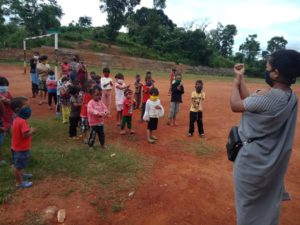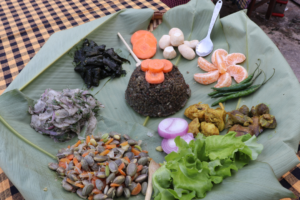Students at a Khliehumstem school were uninterested in the meals provided by the administration, finding them too simple and bland, once upon a time. Many students chose to bring homemade food instead, as the meals provided by the school lacked variety and consisted mainly of rice and dal. With a budget of only four rupees per student, even offering an egg was a challenge. As a result, around half of the students preferred bringing their meals from home.
Mrs. B. Teron, teacher of Khliehumstem Presbyterian UP/LP School shared the inspiring story of their school’s transformation thanking the leadership of the community and partnership with NESFAS. Before the community-led school meals project, students were reluctant to eat meals provided at school because the food was too simple.“The situation changed dramatically with the introduction of the NESFAS project.” she shared. “Now, students eagerly anticipate school meals, enjoying a variety of nutritious dishes,” she added. Furthermore, they even started to inquire about the different types of vegetables being served, showing a newfound curiosity and appreciation for food. Before this, students were unaware of the wild edibles available in their community. Now, they not only recognize but also enjoy consuming them. This knowledge extends beyond school, as they incorporate these foods into their diets at home. Shemlang Teron, a Khliehumstem Presbyterian UP School student, said, “Through the school meals I have learned about and tasted the different kinds of wild edibles that are available in our community.”
The positive impact on the students’ health and well-being has been significant. Teachers have noticed improvements in the students’ physical health and increased activity levels. The happiness and health of the students have been a great source of satisfaction for the teachers, who see their efforts paying off. Despite being from a remote area with limited resources, the school has achieved great success, all thanks to the support and collaboration with NESFAS.
The school’s progress has been evident in various ways. One notable achievement was the organization of a school fest, which surprised many attendees. People were amazed at how a school from such a remote area could raise substantial funds and organize a large-scale event. This success prompted inquiries about how they managed to achieve such feats, leading to discussions about NESFAS initiatives. The school’s efforts have inspired not only its students and staff but also other schools and communities in the region.
However, the journey has not been without challenges. Initially, there was hesitation to take up the project due to limited resources and the school’s inability to complete its curriculum consistently. The teachers were concerned about managing the project alongside their regular duties, as they often found themselves in the kitchen instead of the classroom. Despite these concerns, NESFAS remained supportive, encouraging the teachers and cooks to persevere and implement the project.
One of the practical challenges was sourcing the required amount of fresh vegetables. The school’s Agroecology Learning Centre (ALC) members couldn’t always meet the demand, so they allowed local farmers and non-ALC members to supply vegetables. The teachers also contributed financially, donating Rupees 20 daily to support the school meals. Students were encouraged to bring vegetables from home, resulting in a rich variety of fresh produce for school meals.
The benefits of the project extended beyond improved nutrition. There were days when vegetable production was so high that the school couldn’t purchase all the produce, allowing farmers to sell the surplus in local shops. This arrangement ensured that the vegetables sourced for the school were chemical-free grown, further enhancing the nutritional value of the meals. The student’s contributions often resulted in more than five food groups being available daily, offering a balanced and varied diet.
Parents have also noticed the positive changes in their children. Many children, who once refused to eat at home, now eagerly anticipate school meals, sometimes even asking if their plate has been packed before heading to school. This enthusiasm reflects the success of the project’s aim to provide appealing and nutritious meals.
“I feel the enhanced school meals have greatly benefited our children. With nutritious food that helps nourish their bodies, often more interesting than what they receive at home, the children seem to enjoy it as well”, shared Kong Steamlet Phangcho, parent, Khliehumstem.
The community dorbar has also become more involved in school activities. Initially, the community committee and headman only attended school events when invited. Now, they actively participate in school programs, and the community hall has become a central space for school activities. The community executive committee has provided valuable support, such as contributing firewood for cooking and helping to address various challenges faced by the school.
In conclusion, the journey of Khliehumstem School has been one of overcoming challenges through collective effort and community support. Despite limited resources and initial hesitations, the school’s partnership with NESFAS and extensive support from the community, has led to remarkable achievements. The project has not only improved the students’ health and happiness but also created a sense of unity and shared purpose among teachers, students, parents, and the broader community. This experience serves as an inspiring example of how even schools in remote areas can achieve great success with determination and support.



